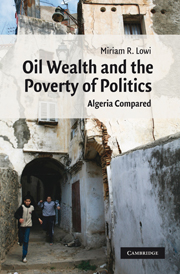Book contents
- Frontmatter
- Contents
- List of tables
- List of figures
- Preface
- Map of Algeria
- Part I Introduction
- 1 Oil shocks and the challenge to states
- 2 Natural resources and political instability
- Part II Algeria and its discontents
- Part III Comparisons and conclusions
- 8 Conclusions: oil wealth and the poverty of politics
- Bibliography
- Index
- CAMBRIDGE MIDDLE EAST STUDIES 32
2 - Natural resources and political instability
Published online by Cambridge University Press: 29 March 2010
- Frontmatter
- Contents
- List of tables
- List of figures
- Preface
- Map of Algeria
- Part I Introduction
- 1 Oil shocks and the challenge to states
- 2 Natural resources and political instability
- Part II Algeria and its discontents
- Part III Comparisons and conclusions
- 8 Conclusions: oil wealth and the poverty of politics
- Bibliography
- Index
- CAMBRIDGE MIDDLE EAST STUDIES 32
Summary
Natural resources and the political economy of development
With the division of the international economic order into exporters of manufactured goods and exporters of primary products, the former have been associated historically with relatively high growth and development, while the latter have been associated with relatively slow growth and skewed, if not under-development (Lewis 1977). If one considers natural resource availability alone, one finds that resource-deficient countries have fared far better than their resource-abundant counterparts in terms of income distribution and gross national product (GNP) growth. Between 1960 and 1990, for example, the per capita incomes of resource-deficient countries increased 2–3 times faster than those of resource-rich countries, and the gap in growth rates widened significantly from the 1970s (Auty and Mikesell 1998; Sachs and Warner 1995). Indeed, quantitative research has confirmed that there is a negative relationship between natural resources and economic growth. Of the resource-rich, the mineral-driven countries have been among the weakest performers. Furthermore, the resource-rich countries as a whole tend to be more prone to policy failures which, in turn, provoke growth collapses.
Given that capital scarcity – conventionally thought of as the source of economic backwardness – is not a significant factor in economies driven by high-value resources such as petroleum, how can we explain the relatively disappointing performance of this category of states?
- Type
- Chapter
- Information
- Oil Wealth and the Poverty of PoliticsAlgeria Compared, pp. 27 - 44Publisher: Cambridge University PressPrint publication year: 2009



